 If your teeth seem especially sensitive after you brush them or when you consume certain foods or beverages, you're hardly alone: By one estimate, around 35 percent of the U.S. population experiences some degree of tooth sensitivity. While the difference between sensitivity and pain may be somewhat blurry, we can say that sensitive teeth usually produce discomfort in response to a stimulus like temperature, pressure, or even the sweetness of particular foods. What causes tooth sensitivity — and what should you do about it?
If your teeth seem especially sensitive after you brush them or when you consume certain foods or beverages, you're hardly alone: By one estimate, around 35 percent of the U.S. population experiences some degree of tooth sensitivity. While the difference between sensitivity and pain may be somewhat blurry, we can say that sensitive teeth usually produce discomfort in response to a stimulus like temperature, pressure, or even the sweetness of particular foods. What causes tooth sensitivity — and what should you do about it?
In general, tooth sensitivity results when dentin, the living tissue that makes up most of the “body” of the tooth, begins transmitting sensations to nerves deep in the tooth's inner core. The nerves relay these sensations to the brain, and they're felt as pain. To understand how this works, let's take an even closer look at your teeth.
Tooth Anatomy 101
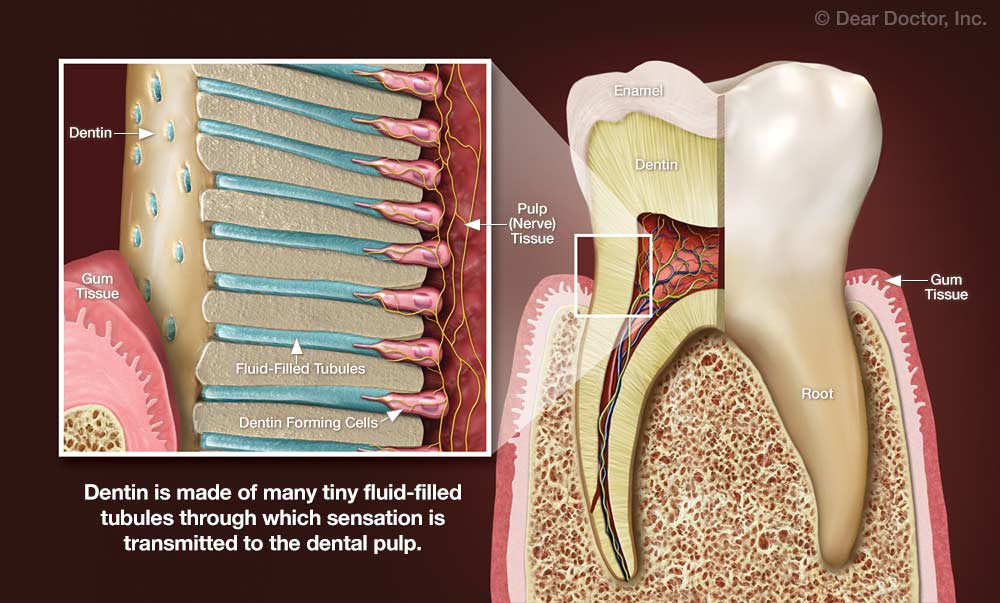
Dentin is a sturdy, calcified tissue, that can't usually be seen. It's normally covered by super-hard enamel on the visible part of the tooth (the crown), and by softer tissue called cementum on the tooth's roots (which typically lie below the gum line). The dentin itself is composed of many tiny tubules. When these tubules become exposed to the environment of the mouth, tooth sensitivity and pain may result.
There are several reasons why the dentin can become exposed. For one, the gums may recede (shrink down), revealing some of the tooth's root surfaces. This can be caused by genetic factors, periodontal disease, excessively vigorous brushing — or a combination of all three. This problem may be worsened if the tooth's roots weren't completely covered by cementum during their development, as sometimes occurs.
Another factor that may contribute to sensitivity is the erosion of tooth surfaces due to excessive acid in the diet. While acids occur naturally in the mouth, habitually drinking sodas and sports drinks can severely erode teeth — and brushing soon after you drink actually worsens the effect. That's because these acids soften the outer surfaces of the teeth, and brushing then makes it easy to wear them away. It's best to wait for an hour afterwards, to give your saliva a chance to neutralize the acid.
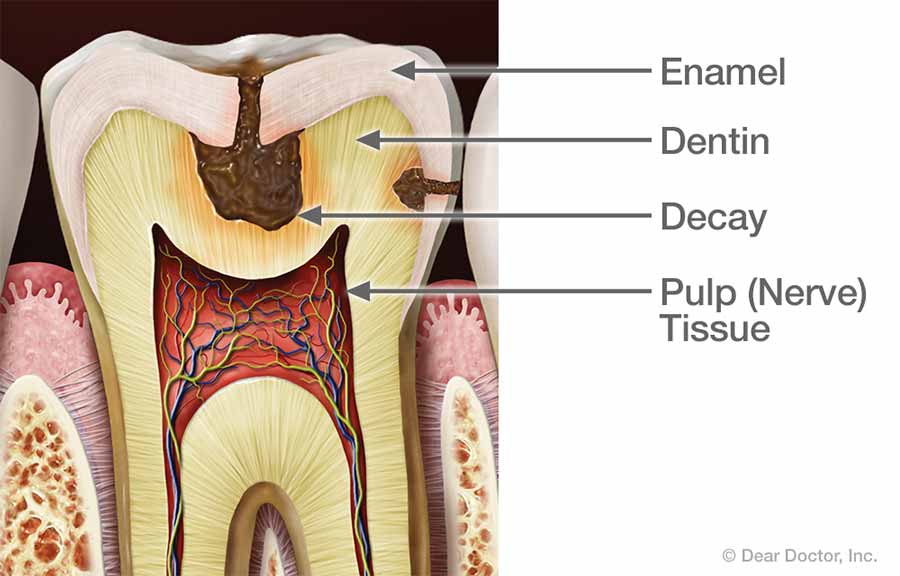 Tooth decay can also cause sensitivity. Decay may not only expose dentin, but can work its way down to the nerves themselves — at which point, your pain level will escalate. And sometimes, even dental work itself can cause sensitivity. Because the same tooth structures are involved, it may sometimes take a few days after a cavity is filled, for example, for a tooth to “calm down.”
Tooth decay can also cause sensitivity. Decay may not only expose dentin, but can work its way down to the nerves themselves — at which point, your pain level will escalate. And sometimes, even dental work itself can cause sensitivity. Because the same tooth structures are involved, it may sometimes take a few days after a cavity is filled, for example, for a tooth to “calm down.”
Dealing With Tooth Sensitivity
What can you do about sensitive teeth? If it's a relatively minor irritation, try not to brush the affected teeth too long or hard. Make sure you're using a soft-bristled brush and the proper, gentle brushing technique — which we can demonstrate for you. Always use a toothpaste containing fluoride, as this ingredient is proven to increase the strength of tooth enamel, which helps resist erosion. You can also try a toothpaste with ingredients designed especially for sensitive teeth, such as potassium. Studies show that these can be effective… but it may take approximately 4 – 6 weeks for you to notice the difference.
If sensitivity persists, however — or if your tooth pain becomes more intense — don't hesitate to call us for an examination. We can determine what's causing the problem, and help you find the most appropriate way to reduce the sensitivity. Some treatments we offer may include concentrated fluoride varnishes, prescription mouthrinses, or materials that are bonded to the outer surfaces of teeth. But tooth sensitivity may also be an early warning sign of other dental problems — and the sooner they're taken care of, the better off you'll be!
Related Articles
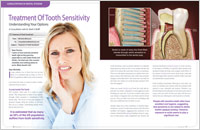
Treatment of Tooth Sensitivity As many as 35% of the U.S. population suffers from tooth sensitivity. Causes include overly aggressive brushing, which causes the gum tissue to recede exposing the root surfaces of the teeth; and acidic beverages, which erode the teeth. Fortunately, there are products available for use at home or in the dental office that can help... Read Article
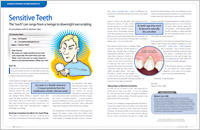
Sensitive Teeth Tooth sensitivity — to hot or cold, for example — is often a problem where the gums have receded, exposing the root surfaces of the teeth. These areas of the teeth have sensitive nerve fibers. Find out what steps you can take to minimize this problem... Read Article
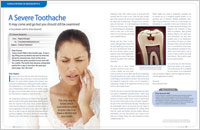
A Severe Toothache You may think a painful toothache that goes away on its own is no longer cause for concern. However, it's still worth a visit to the dentist. The disappearance of pain could mean that the nerve tissue deep inside the tooth has died, yet an infection is still present... Read Article
